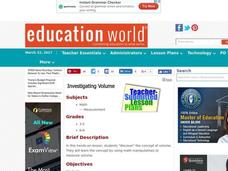Education World
Investigating Volume
Explore the concept of volume using unit cubes. Working individually or in small groups, your class measures with a ruler in inches and calculates the volume of various rectangular household boxes (provided by the teacher) and completes...
Curated OER
Ordering Sets of Measures
Using numbers with varying units (money, length, volume, distance, weight), scholars put each set in order from least to greatest. There are five numbers in each set, and they are all whole numbers with units attached (numbers in each...
Curated OER
Ordering Sets of Measures
This isn't an ordinary number sequencing activity; as scholars put these values in order they must pay close attention to the units attached. Each set of numbers has different units of measurement, so they must convert to order them from...
Scholastic
Study Jams! Units of Measurement
As Mia and RJ discuss measurement, your class is introduced to the customary and metric systems for measuring mass, capacity, weight, and length. Temperature scales are also introduced. This resource can help set the foundation for later...
Curated OER
Geometry and Measurement
Young geometers explore relationships between units of measure and objects. Three activities provide varied opportunities to practice. Learners calculate the volume of two cylinders made by rolling a piece of paper vertically and...
Baylor College
Living Things and Their Needs: The Math Link
Enrich your study of living things with these cross-curricular math activities. Following along with the story Tillena Lou's Day in the Sun, learners will practice addition and subtraction, learn how to measure volume and length, work on...
Curated OER
Measuring for Chemistry: Moles, Compounds, and Conversions
Through a station rotation activity, scientists complete 9 chemistry activities to complete this interactive worksheet. Concepts include molar masses, percent composition, accuracy vs. precision, mass of an object, scientific notation,...
Curated OER
Measurement
Students create two prisms out of the same paper. They calcuate the number of centimeter cubes needed to fill each prism. They discover the concept of volume.
Virginia Department of Education
Volume of a Rectangular Prism
Fill the minds of your young mathematicians. A hands-on activity has learners fill in a rectangular prism with unit cubes to determine its volume. the exercise provides a great hands-on way for learners to connect the activity to the...
Curated OER
Measurement
Students explore the necessity for standards of measurement and measure length, volume, mass and angles. In this measurement lesson plan, students use their hand and foot to measure objects in the room. They compare their measurements to...
Curated OER
The Amazing Inch and Measuring Up!
Fifth graders study the metric and customary systems of measuring length with rulers, meter / yardsticks, and tape measures. They determine area of polygons and surface area and volume of three-dimensional shapes. They list as many...
Curated OER
Units of Measurement
In this math worksheet, students study information about U.S. units of measurement and the equivalent metric units. Included are capacity, volume, area, mass and length. There are no problems on this page to do.
Curated OER
Volume Lab
How can we find volume if it a shape isn't easy to measure? Investigate methods for determining this as the volume of regular and irregular objects is explored in several stations. Learners discover that when the standard formula for...
Curated OER
Mind Your Pints and Quarts: Making Sense of Liquid Measurement
Elementary and middle schoolers identify different units of liquid measurement. They use the online Visual Thesaurus to learn about the relationships between units of liquid measurement.
Curated OER
Metric System Basics
Do your learners know that there are different systems to measure length, volume, and weight? Explain metric measuring and its base ten decimal system using this comprehensive set of worksheets! For all three types of measurement,...
Curated OER
Measure Mania
Groups of students rotate through five classroom stations to estimate, measure, and record volume, length, weight, mass, and area using both customary and metric measure. They evaluate their data to determine how close their estimates...
Curated OER
Volume
Young scholars, after reviewing the measuring of the lengths of sides of different shapes along with the calculation of their perimeters and areas, encounter what it means by the 'perimeter' of a polygon. They practice measuring units of...
Curated OER
Volume of Rectangular Pyramid
In this volume activity, learners determine the volume of a rectangular pyramid. They calculate the volume when given the length, width, and height. This two page activity contains eight multi-step problems. Answers are provided on the...
Curated OER
Measure Twice, Cut Once
Elementary schoolers learn about metric units and how they are used by engineers. They learn how engineers use the units to measure mass, distance, and volume. Then, they estimate measurements of units, and compare them to actual...
Curated OER
Measurement Tools
Which of these is the best tool for the job? Learners examine a measurement scenario and determine which of five tools would be the right choice. There is only one problem, and the activity includes pictures. Because the answer is...
Curated OER
Similarity of Length, Area, and Volume
For this similarity worksheet, learners determine the length, area and volume of similar figures. This three-page worksheet contains explanations, examples, and 20 problems. Answers are provided on page three.
Curated OER
Perimeter, Area or Volume?
In this perimeter, area and volume worksheet, 5th graders solve 6 word problems, then tell whether they found perimeter, area or volume.
Curated OER
Length, Perimeter, and Area
Young scholars explore the concepts of length, perimeter, and area. In this math instructional activity, students use Shape Explorer to practice finding length, perimeter, and area.
Curated OER
Volume and Density Worksheet
All 20 of the problems on the worksheet involve the computation of cubic volume or density. As long as your young scientists can apply the appropriate mathematical formulas, they will succeed in solving these problems. They are not...

























